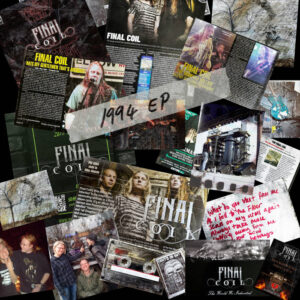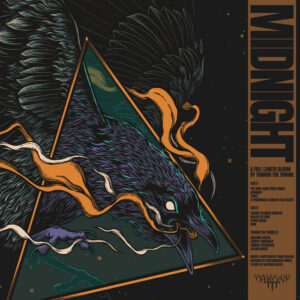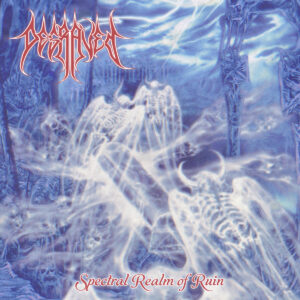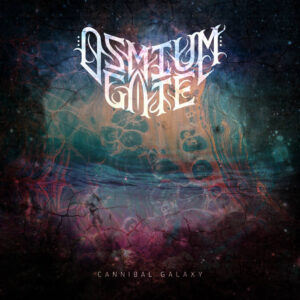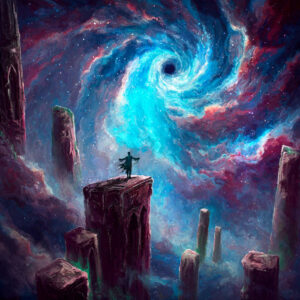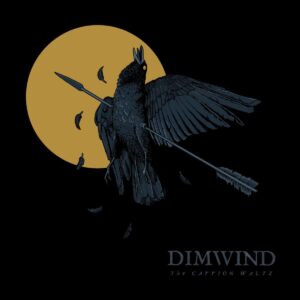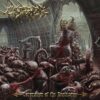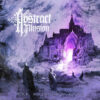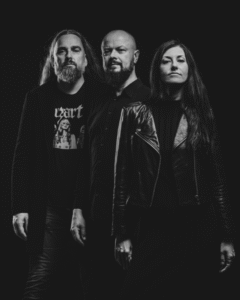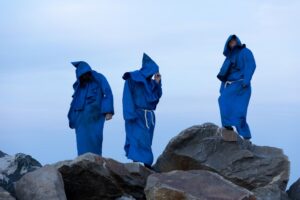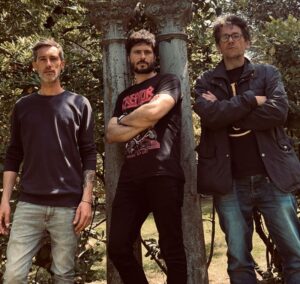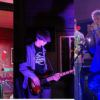Cam Mesmer & Al Lester
Spell
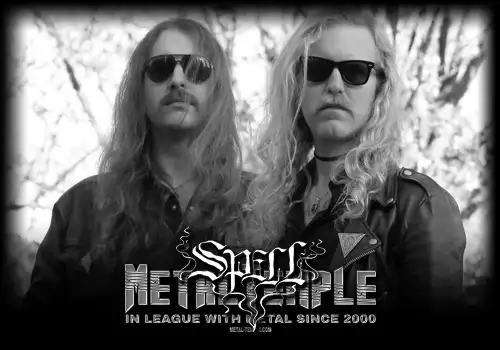
Al: Hey Lior, thanks for the interview!
Cam: Great to meet ya!
Al: The last few years have been hard on a lot of people, and definitely a bit like a twisted dream for most of us I'm sure. So I guess it's no wonder the album feels that way too! We were working on the album for the first two years of the pandemic basically, so we kept ourselves pretty busy with that, and with other musical projects, and our regular jobs and lives.
Al: Graham played with us in this lineup for over a decade, so it was definitely a big change for the band. There's not too much to say about it really other than we didn't all have the same vision or goals for Spell so it was better to continue on separately. We wish him all the best.
Cam: Yeah, he wasn't interested in playing the kind of music we wanted to do any longer and it had been getting really difficult to get him to learn the songs in time for recording our previous album (Opulent Decay), so before we started working on Tragic Magic we told him we were going to continue on as a two piece.
Al: I guess to put it simply - Magic always comes at a cost. Pacts get sealed with blood, and souls get sold to obtain desires. As with any artistic endeavor, you put all your time, effort and resources into your creation, chasing little glimpses of something that seems magical to you. Giving yourself over to your passion against your better senses and paying the price.
Cam: A lot of the songs are about this theme in one way or another. Cruel Optimism is a particularly obvious example: it's about how we've been bull-headedly pursuing this dream of being in a heavy metal band for so long now, endlessly optimistic about where it will might take us — but now, suddenly, I realize that the better part of my youth is behind me, and I've given up on so many other opportunities in favour of heavy metal. A lot of my peers have families, homes, good jobs… it's mostly too late for me to pursue those things now. So, in retrospect, my mindless optimism seems to have been pretty cruel.
Al: There are songs about the loss of a family member and loss of intergenerational knowledge, about Alzheimer's disease and the terrifying effects it has, about the powerful nature of dreams and about our own limitations regarding what we are able to perceive and understand of the universe we live in. Some of the songs concern mortality and our connection to the deceased and those who came before us. The lyrics are all based on our thoughts and experiences, we are never really telling someone else's story or telling a fictional story, as we really only want to write about topics we truly feel some deeper connection or urgency about.
Cam: I like to write about the most challenging experiences that I have, in the hopes that someone else might be able to identify with what I'm feeling and get some kind of catharsis from it. It's so easy to feel isolated when you're going through something difficult. We all struggle, so I think we've got to do what we can to support each other, even if it's just hearing a lyric and recognizing that you're not alone. I don't much go for fantasy or escapist lyrics — all my favourite bands write about the real stuff that they're going through. Priest, Sabbath, Purple, Accept, also Cauldron and quite recently, I respect Sonja for that reason!
Al: Well the pandemic experience has certainly made it clear that everything in the world can change at the drop of a hat. So whatever that dream you are putting off might be- do it now and don't wait.
Cam: The songwriting on this album is much more direct and to the point. The last few years have made us realize that we have no time to waste. Nobody does, and nobody wants to hear any self-indulgent noodling around. Get to the point. Say your peace and move on. That's what we tried to do with this record.
Al: I think everyone has some sense of fear and awe of the unknown, that's just human nature and what makes life exciting. I work in a mortuary setting so every day all day I am confronted with "what could happen to me" (if I were to be fatally ill or injured). I think I have a healthy respect (and deep obsession) for the unknown, and an ample awareness of and adequate attention to mortality. Stay safe and take care of each other folks, it's easy to die!
Cam: I seem to have this anxious obsession with recording and releasing my music as fast as I can, because who knows what could happen tomorrow? So many things have to go right for a band to be able to make a record — everyone has to be healthy, all the equipment has to work, supply chains have to be in order, the label has to be up and running, etc, etc. It's incredible to have that much luck all at the same time! Any chance you get to release some music is a great gift, so don't hesitate!
Cam: Yes, when I first saw the painting I was blown away. It so perfectly captures the themes of the album! We discovered this painting while looking through endless piles of art books in the basement of a secondhand bookstore in town. Usually the basement is off limits to customers, but I've gotten to know the proprietor a bit because I worked in another used bookstore for years, so sometimes he lets me down there to root around. It's huge — tens of thousands of books, maybe more, all without any organizational system. So, whenever I happen upon exactly what I need down there, it does feel like a bit of magic. It's dark, too, so we were squinting away down there, looking for weird obscure art books, and suddenly this painting came up. I couldn't believe my eyes. I immediately knew it would be the cover. When I read the story behind the work, I was even more convinced: this was the painter's masterwork. He worked on it for years, but the critics hated it from the first showing! In anguish, the artist slashed the painting and took his own life. Luckily, the painting was later repaired. If that's not "tragic magic," I don't know what is.
Al: I agree that a lot of great things happened in the early 80s, some of the most influential music for us is from that era. That being said, we are never really deliberately trying to emulate a specific era or create a fusion of genres. We are just playing heavy rock music that we want to hear and trying to make it enjoyable and exciting as well as thought provoking. I find that people seem to read a lot into things like using synths, playing some odd time signatures, having some softer or more subdued songs, playing 16th note grooves, having a big bass sound etc. All the classic heavy metal bands basically all did all of those things and it didn't make them fusion, prog, shoegaze, gothrock, etc. To us it's just a normal approach to heavy metal and hard rock.
Cam: Yeah, it's kind of funny. We're mostly just trying to make 'normal' heavy metal music, as that sounds to our ears – yet when people hear our songs, everyone's like 'Prog! Fusion! Originality!' which is fine with us of course, but it kind of makes me laugh. I don't think our music is really all that original at all. I steal my ideas from classic bands just like everyone else! I think that the genre 'heavy metal' has gotten so narrow nowadays that people seem to think that if you're not playing guitar harmonies on a 5150 at tempo 200 with double kicks and falsetto screamed lyrics about conan the barbarian, then it's not 'heavy metal' — look at the classic bands, almost none of them did that. It's like a weird false imagining of history. I think our music and sound is actually pretty standard, but heavy metal has gotten so narrow and exclusionary recently that most of the classic genre-defining bands wouldn't even be considered 'heavy metal' if they were to come out today!
Al: I think rather than exploring on this album we were trying to distill our sound into a more direct, more succinct and effective version of itself. We do love B.O.C., and lately I have been really into the Club Ninja album. We always love streamlined action-ready heavy metal like Accept and Michael Schenker Group. Stuff that is rough and tough but still moves and grooves. We also love big atmospheres like you might find in The Damned 'Phantasmagoria', Candlemass, King Diamond, or Bathory 'Twilight of the Gods'. We both listen to lots of different music across many genres.
Cam: Yeah, I don't think there was any point in history where musicians were exclusively listening to one genre of music. We love tons of stuff and believe in taking inspiration from all kinds of genres and bringing in the elements that are going to work within a heavy metal context. Back in the day, you would have had all the biggest bands recording at the same studios, sharing equipment and producers, so I think there was a lot more mixing and blending. Nowadays it seems more like 'metal bands go to metal studios, punk bands go to punk studios' etc. We don't really believe in that.
Cam: It seems pretty similar to me — it's always been me & Al working on the songs. Most of the time, I'll have an idea or two while I'm playing guitar at home, and then I'll bring 'em down to the jamspace to workshop with Al. Sometimes he'll have an idea that fits with it, and he'll jump on the guitar while I take over the drums for a minute to hammer it out. Then eventually we'll work out all the little transitions and get the bass & drum groove locked, and then cut a demo. The only real difference this time was that we were a lot more discerning about editing ourselves, cutting out anything extra that wasn't fundamental to the structural integrity of the song. I don't want to waste people's time with second rate riffs. It wasn't easy, but I'm quite proud of how we distilled these songs to their most basic elements. Writing a three minute song is WAY more difficult than writing a five minute song, that's for sure!
Cam: Yeah, we like that sound and feel it adds a lot. On the past albums, Graham and I shared keyboard duties in the studio. This time, I worked on keyboards with our pal Gabriel, who also plays in the local goth/new wave band "Girlfriends & Boyfriends." He has a great little studio with a ton of huge synths, so it was really fun to workshop stuff and play with incredible sounds. Gabriel will be playing live synth and guitar with us too, as well as our other dear friend Jeff from the band Gatekeeper! This new line up is really exciting because we finally have four members and at last we can play all the harmonies and synth lines the way they were intended to be.
Cam: Thanks! We spend a lot of time working on the tone for each song. It's so many hours of labour that I occasionally feel like it's wasted effort that nobody notices, so thank you for picking up on it! I always find it a little bit of a
missed opportunity when a band just records their whole album with the same guitar sound. Like, every song is different! Find something that works for that song! We used about 7 different amps, 10 different guitars, and probably 20 guitar pedals to make Tragic Magic. All of our guitar effects are recorded live, not added after digitally. We just wanted to capture the vibe of each song as we were making it.
Cam: Sure, thank you! We're very proud of this song — I especially love Al's solos at the end! The song is about a real experience I had while hiking in a remote place on Vancouver Island, minus the last line, which is metaphorical. Overall, it's about the connection I have to the land on which I live. It's a bit of a nostalgic tune, I guess, so I can see the connection to your youth. The 80's pop thing also makes sense because I think the final result gives off a bit of an 'Alan Parsons Project' vibe.
Cam: This song is very literally about the hidden powers that affect us, that we cannot understand or control. I took the metaphor of ultraviolet light, which is invisible to our eyes, but allows us to live by providing energy and nutrition to the earth, and also kills us by burning our eyes and skin, giving us cancer and decay. In this song, I wonder what other powers might be out there, taking their influence on us, that we cannot feel or see due to the limitations of our physical bodies.
Cam: Yep — as said above, we're really excited to be playing with Jeff and Gabriel now, and our live show will be far better than it's ever been before! We're booked at some festivals, on both sides of the Atlantic! I'm not allowed to announce most of 'em yet, but keep your eyes peeled!
Thanks a lot, pleasure chatting with you! We're already hard at work on the next album, so just wait!!

More results...

